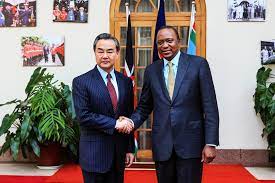On Wednesday, China’s foreign minister began a visit to Kenya, where the government has relied on Chinese financing to create infrastructure but has been chastised for the debt burden that has resulted.
The visit by Wang Yi, who is also a state councilor, was termed as “historic” by Kenya’s foreign ministry. Security, health, climate change, and green technology transfer will be discussed, according to the statement, and new bilateral agreements will be inked.
After Eritrea and before Comoros, Wang’s African journey continues in Kenya. In November, Eritrea became a member of Chinese President Xi Jinping’s Belt and Road Initiative (BRI), a long-term plan to fund and build infrastructure connecting China and the rest of the globe.
As part of the BRI, China has provided billions of dollars in loans to African countries, including $5 billion for the construction of a modern railway from Kenya’s port of Mombasa.
That paradigm has evolved, partially as a result of the COVID-19 pandemic and its economic consequences, and partly as a result of criticism from African critics of rising debt levels. China is moving its focus away from hard infrastructure loans and toward trade expansion.
Kimani Ichung’wah, a governing party lawmaker who has become a critic of the administration, is one of the critics of Kenya’s reliance on Chinese money.
“It’s a debt trap, and they need to start renegotiating,” he told reporters before Wang’s arrival, citing the excessive interest rates on Chinese loans.
Ichung’wah is favoring William Ruto, President Uhuru Kenyatta’s estranged deputy, in the August presidential election, and has stated that if Ruto wins, his government will demand new loan repayment terms.
Eritrea, one of the world’s poorest and most isolated countries, is participating in the conflict in northern Ethiopia’s Tigray area, which has destabilized the Horn of Africa region.
Wang’s visit, according to Lina Benabdallah, a China-Africa researcher at Wake Forest University in the United States, signaled Beijing’s interest in restoring peace to the Horn of Africa and boosting access to Africa through Eritrea’s Red Sea ports.
The Comoros stop, according to Peter Kagwanja, an international relations lecturer at the University of Nairobi, was likely tied to economic interests. He said that the Indian Ocean archipelago stands on the rim of a maritime trade route known in China as the Maritime Silk Road, which Beijing regards as strategically crucial.




















